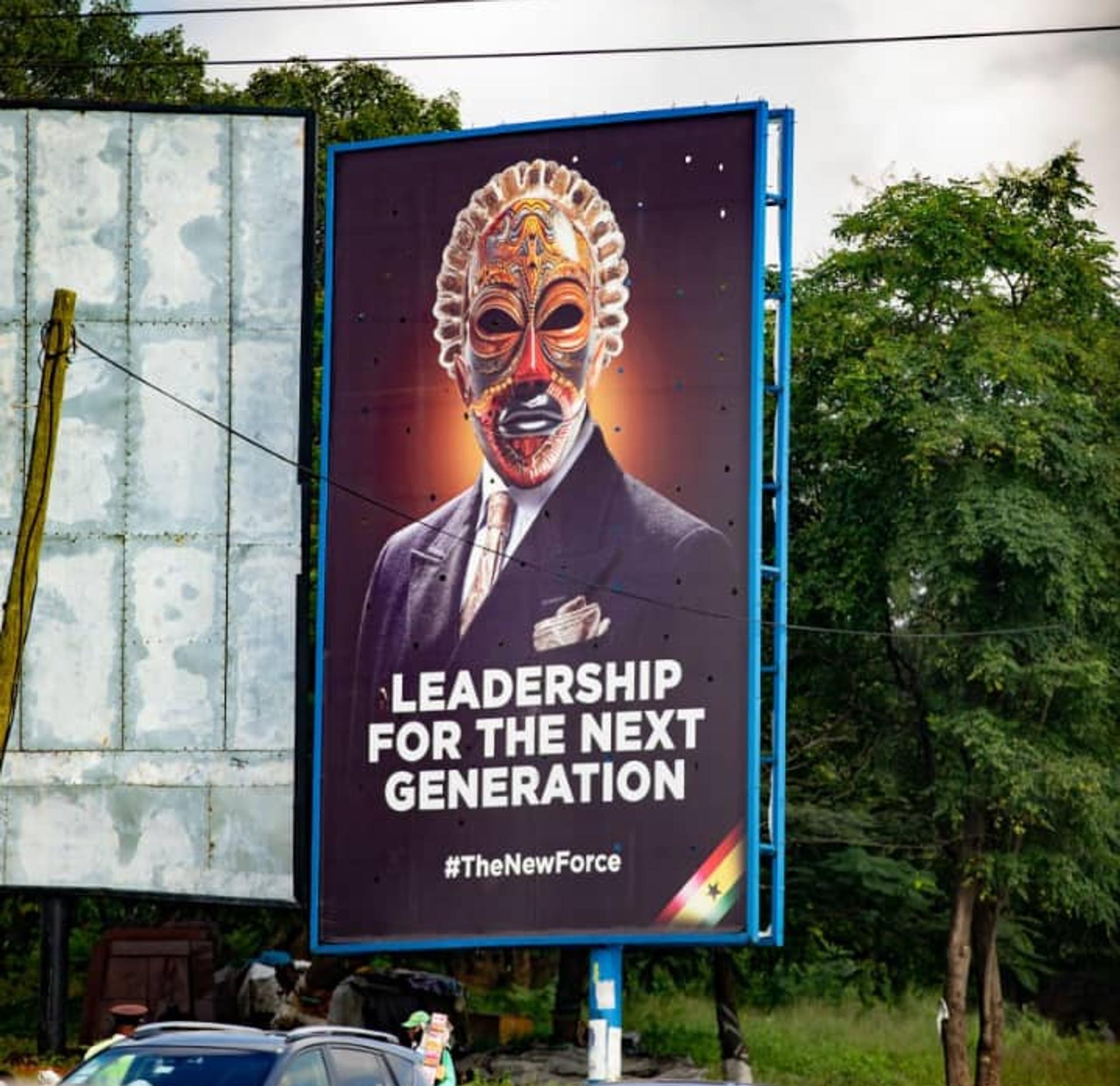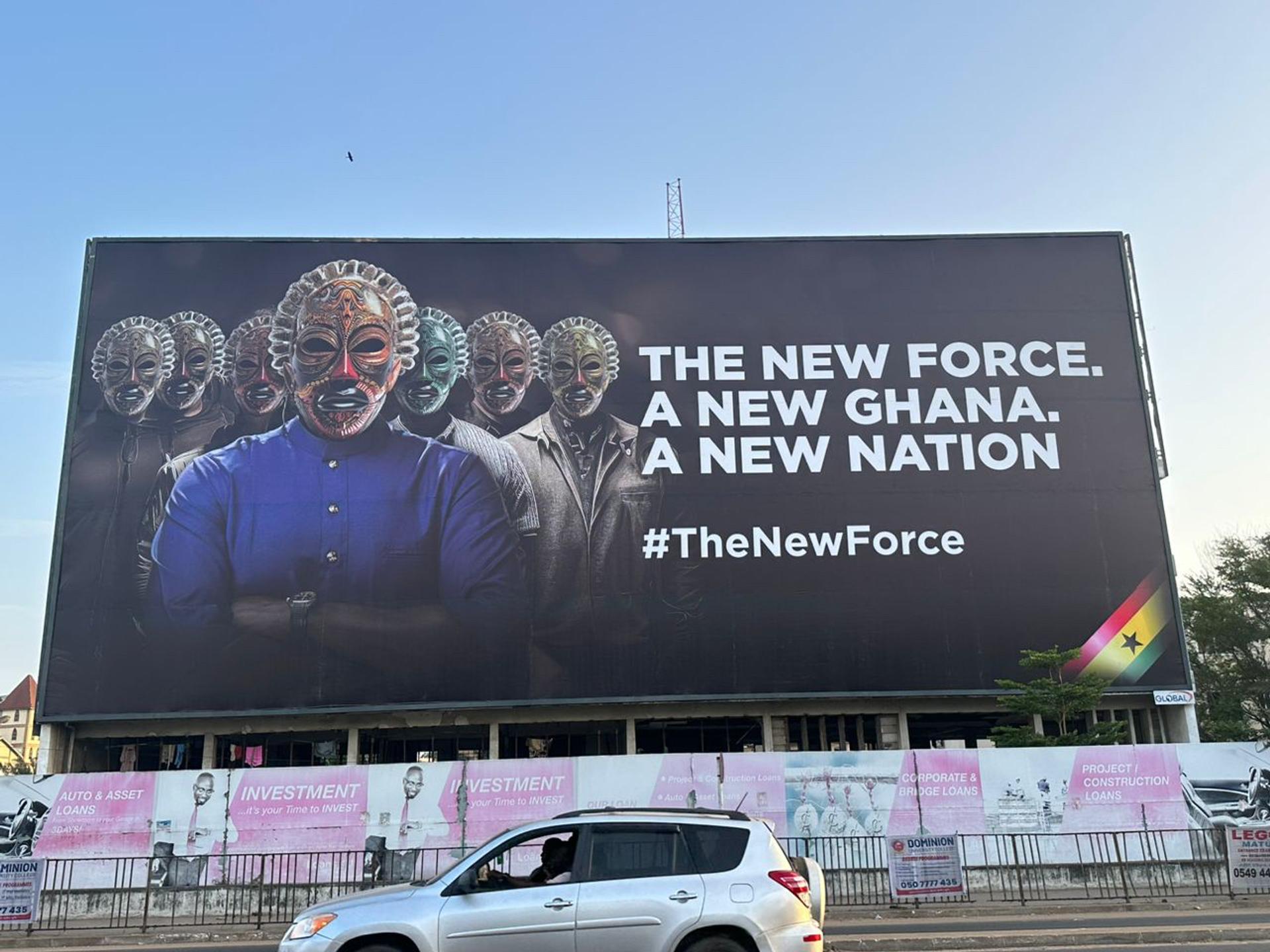The Facts
ACCRA, Ghana — Giant billboards featuring a man in a mask and the simple message “leadership for the next generation #thenewforce” have appeared in major cities across Ghana in recent weeks. Other billboards, featuring a masked man flanked by other people with covered faces, have been rolled out as part of the campaign.
The billboards have been placed beside busy streets in major cities such as Accra, Kumasi, Cape Coast, Takoradi, Ho, and Tamale.
The campaign issued a statement late last month in which it said the identity of the masked person will be revealed in “the shortest possible time,” along with “policy objectives and goals.” However, a spokesperson did not respond to Semafor Africa when asked when the person’s identity would be made public.
In this article:
Know More
→ Why is this happening? Ghana will hold presidential elections in exactly a year. Power has alternated between the two main political parties — the New Patriotic Party (NPP) and the National Democratic Congress (NDC) — since the country’s switch to multi-party democracy in 1992. However, critics of the main parties say their governance has been marred by nepotism, corruption, and financial mismanagement.
The five smaller parties are fragmented and their combined tally typically makes up less than 5% of the vote in elections. Campaigning ahead of next year’s election is gathering pace at a time when Ghanaians are enduring the worst economic crisis in a generation — one that forced the NPP government to turn to the IMF for a $3 billion loan.
→ Who’s behind this? It is unclear who the man behind the mask on the billboards is, but most people believe it is a businessman named Nana Kwame Bediako, also known as Cheddar. “It is obvious it is Cheddar, the stature of the individual looks exactly like him,” graphic designer Felix Frimpong, an Accra resident, told Semafor Africa.
Bright Simmons, research lead at Imani Centre for Policy in Accra, said on social media platform X that the campaign’s financier is a “maverick businessman,” adding that he believed it was Cheddar. Bediako did not respond to Semafor Africa’s requests for comment.
→ How likely is it that a new party could succeed? Despite growing support for the #thenewforce campaign, a new party would have to compete for the third force slot with the Movement of Change, a political group founded by a former trade minister who left the ruling NPP. “A third force will be difficult to emerge at this time to disrupt the NDC or NPP within the next 12 months,” explained Professor Samuel Adu-Gyamfi, a political analyst.

Alexis’s view
It’s almost unthinkable for an insurgent party to sweep its candidate to the presidency. However, a new political force could still play a vital role by diverting attention from the NPP and NDC, which could open up the debate on key election issues.
Ghana’s 2024 election offers a rare opportunity for political disruption due to an array of factors. The key issue is the country’s battered economy, which has driven inflation to levels that have left large parts of the populace struggling to make ends meet. A high profile new party could offer a home for those angered by the failings of the current administration, and a sense that the previous NDC government helped to lay the foundations of the malaise.
Young voters in particular — who are being courted with the offer of “leadership for the next generation — would be the section of the electorate most hungry for a change candidate. There is also uncertainty around the main parties. The NDC, as the main opposition party, should benefit from criticism of the government. But its candidate, John Mahama, is a former president who lost the last two elections — so, as a known quantity, it’s hard to present him as the “change” candidate. Meanwhile, the NPP has chosen the current vice president, Mahamudu Bawumia, as its candidate. It’s the first time the party, whose stronghold is in the south, has selected a northern Muslim.
The team behind the masked man campaign have already shown a flair for marketing that has generated curiosity and media attention — all without having a presidential candidate, official name or any policies. If that marketing savvy can be maintained over the next year it could encourage Ghanaian voters to embrace new ideologies and policies in the future.
